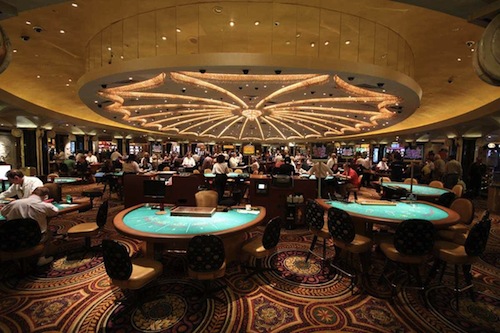
When we think of gambling games, the initial images that frequently come to mind are those of rotating roulette wheels, poker chips clattering on fabric surfaces, and cubes rolling across a gaming area. 92Lottery While numerous view these games as mere pastimes fueled by chance, a more profound exploration reveals a fascinating blend of strategy, skill, and social engagement that elevates them far beyond simple luck. Regardless of whether you are a experienced player or a inquisitive newcomer, understanding the nuances of these activities can significantly enhance your enjoyment and understanding.
Casino activities have evolved over centuries, with different cultures contributing to their diverse backgrounds and different forms. From the intricate strategies of 21 to the deception methods in poker, players engage in a battle of wits as much as a risk on numbers. This exciting interplay between chance and skill creates a thrilling atmosphere that draws millions to gambling establishments worldwide. As we delve into the realm of card games, we will reveal the strategies that can tilt the odds in your advantage and the social elements that make these games a popular choice for entertainment and engagement.
A Approach of Table Games
Table games frequently combine a blend of ability and luck, making them fascinating for players who enjoy a test. Each title has their unique set of rules and tactics that can influence the results. For example, in titles like blackjack, players are required to use tactics like card counting and grasping the odds to make informed decisions. This skill set can greatly improve their victory potential, differentiating seasoned players from novices who may depend entirely on chance.
Conversely, titles such as roulette may appear to be purely based on chance, but strategic thinking can also play into play. Participants can select between different wagering strategies, such as the Martingale strategy, in which they increase the bets after losses. This method can establish a more controlled way to the activity. Understanding the probabilities of specific bets can also help participants make better decisions on the roulette table, showcasing that even games of luck, strategy can enhance the experience.
Furthermore, the game of poker stands out as a game that heavily focuses on tactics. In contrast to most casino titles, poker combines skill, mental acuity, and chance. Participants must also concentrate on the hands they are given but also consider their rivals’ behavior and betting patterns. Mastering concepts like position, the odds of the pot, and interpreting bluffing is crucial for success. This complexity of strategy in the game of poker often leads to a more immersive encounter for participants, where their decisions and skills greatly affect the game’s results.
Comprehending Probability and Ratios
In the realm of gambling matches, probability and odds have a vital role in determining a player’s potential consequences. Every match has its own set of principles that define how the probability of succeeding or losing is measured. For case, in matches like blackjack, players have a opportunity to modify their ratios through planning, whereas in matches like the wheel, the results are exclusively dictated by chance. Understanding how these chances are calculated can substantially impact how a gambler tackles the match.
Odds are typically presented in two formats: fractional and numeric. Ratio ratios indicate the proportion of the sum gained to the sum bet, whereas decimal odds show the overall payout for a successful bet, including the stake. For example, if a game has odds of 5 to 1, this implies that for every one unit bet, a gambler could win five dollars if they win. Knowing how to read these odds allows players to evaluate their possible winnings and make more educated choices during gameplay.
Gamblers should also be aware of the house edge, which is the casino’s inherent advantage over the gamblers. Each match has a distinct advantage, and understanding this idea is crucial for handling one’s hopes and budget. Activities with a lower house edge, such as 21 and chemin de fer, typically offer better odds for gamblers compared to activities like slot machines and lottery. By recognizing the connection between probability, odds, and the casino advantage, gamblers can improve their gambling engagement and strategize more efficiently.
The Social Aspect of Table Gaming
Casino games at casinos are often seen as a hub of community engagement, drawing players together in a collective experience that goes far past the mere act of gambling. The atmosphere at a blackjack table can be electric, with gamblers engaging not only with the game itself but also with one another. Laughter, cheers, and, sometimes, friendly banter create connections that enhance the overall experience of the gaming experience. This communal aspect can turn a solitary endeavor into a dynamic gathering, making table games particularly enticing.
One of the intriguing elements of gaming at tables is the way it cultivates camaraderie among participants. Whether it’s teaming up to defeat the dealer at a dice table or exchanging tales between hands in a poker game, the environment encourages communication. Players often share tips or tactics, creating a sense of togetherness that enhances the fun. This interpersonal atmosphere can make new players feel included and less daunted by the competitive nature of gaming. As the game continues, friendships may form, leading to a sense of belonging that keeps players coming back to the table.
Moreover, the social aspect of gaming at tables extends beyond just the participants. Casino staff play a crucial role in encouraging interaction and maintaining the flow of the game. Their ability to engage players with warm dialogue and their expertise in running the table can create an welcoming atmosphere. This connection between players and staff adds another layer of enjoyment, where gamblers feel bonded not only to each other but also to the staff. Such interactions are often what make the experience unforgettable, as players leave with tales to tell and relationships made, reinforcing the notion that table games are truly about something greater than luck.